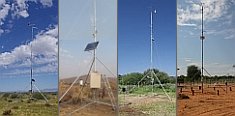Workpackages of Subproject W09
Workpackage WP09.1
Bruno Djossa, Faculté des Sciences Agronomiques, Université d'Abomey-Calavi, Benin
djosbruno@yahoo.fr
Jakob Fahr, Department of Experimental Ecology, University of Ulm, Germany
jakob.fahr@biologie.uni-ulm.de
Prof. Dr. Elisabeth Kalko, Department of Experimental Ecology, University of Ulm, Germany
elisabeth.kalko@biologie.uni-ulm.de
Seed Dispersal of Socio-economic Relevant Tree Species by Flying Foxes (Chiroptera: Pteropodidae) in Areas under Human Influence in N-Benin.
Short description: This project studies the influence of human land use on the diversity and abundance of socio-economic tree species that are also used by flying foxes as food resources. We assume that human land use negatively affects the spatio-temporal availability of fruits with a linked decrease in the abundance and diversity of flying foxes. In previous studies we have shown that flying foxes are critical key stone species for the natural regeneration of woody plants in West Africa. Consequently we will assess if changes in the community structure of flying foxes has a negative feed-back on the regeneration of selected plant species. Our study aims to develop management recommendations which seek to maintain viable bat populations in areas of intense human land use, ultimately safeguarding the long-term survival of socio-economically important tree species such as Karité (or shea tree; Vitellaria paradoxa).
Workpackage WP09.2
Jakob Fahr, Department of Experimental Ecology, University of Ulm, Germany
jakob.fahr@biologie.uni-ulm.de
Prof. Dr. Elisabeth Kalko, Department of Experimental Ecology, University of Ulm, Germany
elisabeth.kalko@biologie.uni-ulm.de
Predictive Modelling of Regional Diversity Patterns, Priority Setting for Conservation Efforts, and Bioclimatic Scenarios of Diversity Shifts through Global Change.
Short description: During the pilot phase of BIOTA, we have established a GIS-data base that comprises the known distribution (point localities) of all of the 120 bat species in West Africa. We identified factors that promote and maintain species richness of this group, namely habitat heterogeneity and topodiversity. During the main phase, we use this data set to model the potential distribution of bats in West Africa. The resulting pattern will be analysed with respect to the current network of existing protected areas with the aim to 1) rank these reserves according to their conservation relevance and to 2) identify important areas that are not covered by the current network (gap analysis). Furthermore, we plan to incorporate bioclimatic scenarios to assess the effect of global change on diversity patterns and future performance of protected areas.
|






 Go to the WeatherNet
Go to the WeatherNet